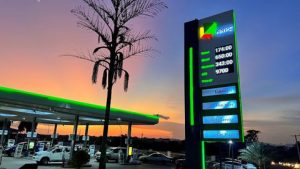
Abuja — Nigeria’s state oil firm NNPC Ltd is winding down crude swap contracts with traders and will pay cash for gasoline imports, its chief executive told Reuters, adding that private companies could begin importing petrol as soon as this month.
The move is part of new Nigerian President Bola Tinubu’s plans to deregulate the gasoline market and reduce the burden on government finances.
Tinubu has already scrapped a costly fuel subsidy, effective from last Tuesday, a decision which tripled petrol prices, angering labour unions who have called for a strike starting on Wednesday if the decision is not reversed.
NNPC has been importing gasoline from consortiums of foreign and local trading firms and repaying them with crude oil via what are known as Direct Sale Direct Purchase (DSDP) contracts since 2016 because it does not have enough cash to pay for the purchases, data and trading sources said.
“In the last four months we practically terminated all DSDP contracts. And we now have an arm’s-length process where we can pay cash for the imports,” Kyari told Reuters in an interview late on Saturday.
This is the first time NNPC has said it is terminating crude swap contracts. By importing less gasoline as private companies import the bulk, NNPC will be able to pay for its purchases in cash, Kyari said.
Nigeria is Africa’s biggest crude producer but imports most of its refined products after running down its refineries.
A significant drop in oil production last year coupled with high global fuel prices due to the war in Ukraine pushed NNPC’s debt to traders higher. It owed the consortiums about $2 billion, a September 2022 NNPC report to the Federation Account Allocation Committee shows.
An industry source with direct knowledge of the matter said NNPC was still allocating crude for fuel swaps for July loading, though less than in previous months. In its report detailing March crude oil loadings, NNPC also allocated crude to the swap contracts held by the consortiums.
Kyari said NNPC’s monopoly on gasoline supplies was ending and private firms could start importing as early as this month.
Kyari said Nigeria’s total crude and condensate output was at 1.56 million barrels a day (bpd) as of Friday. Nigeria has struggled to meet its OPEC oil quota of 1.742 million bpd due to grand oil theft and illegal refining.
That has raised doubts on whether Nigeria can meet supplies for the 650,000 bpd newly commissioned Dangote Refinery. NNPC has a contract to supply 300,000 bpd to the refinery.
*MacDonald Dzirutwe & Camillus Eboh; Julia Payne, Editing: Susan Fenton – Reuters
This article was originally posted at sweetcrudereports.com
Be the first to comment